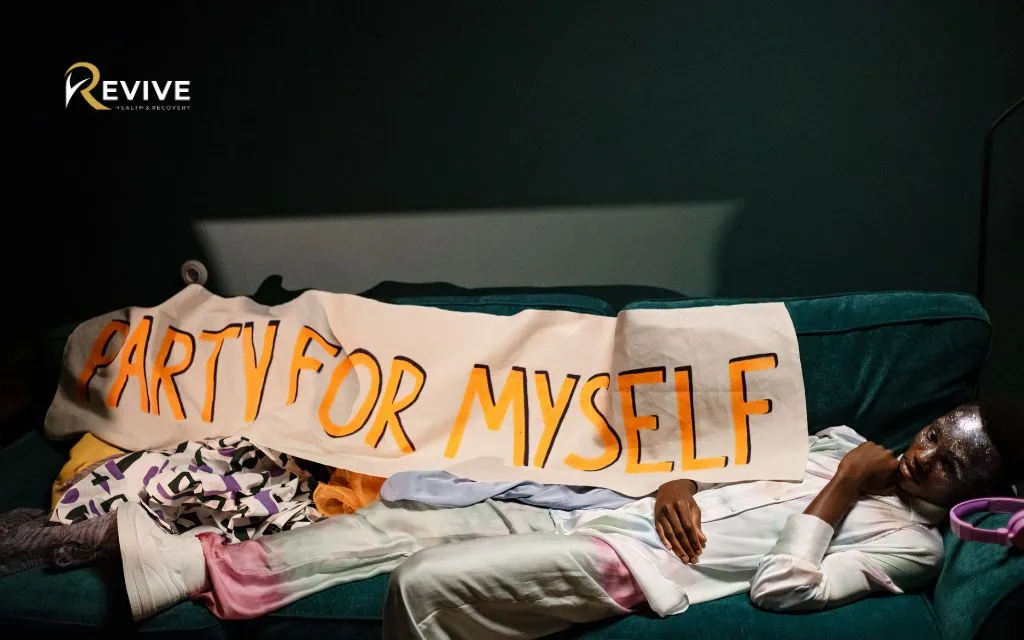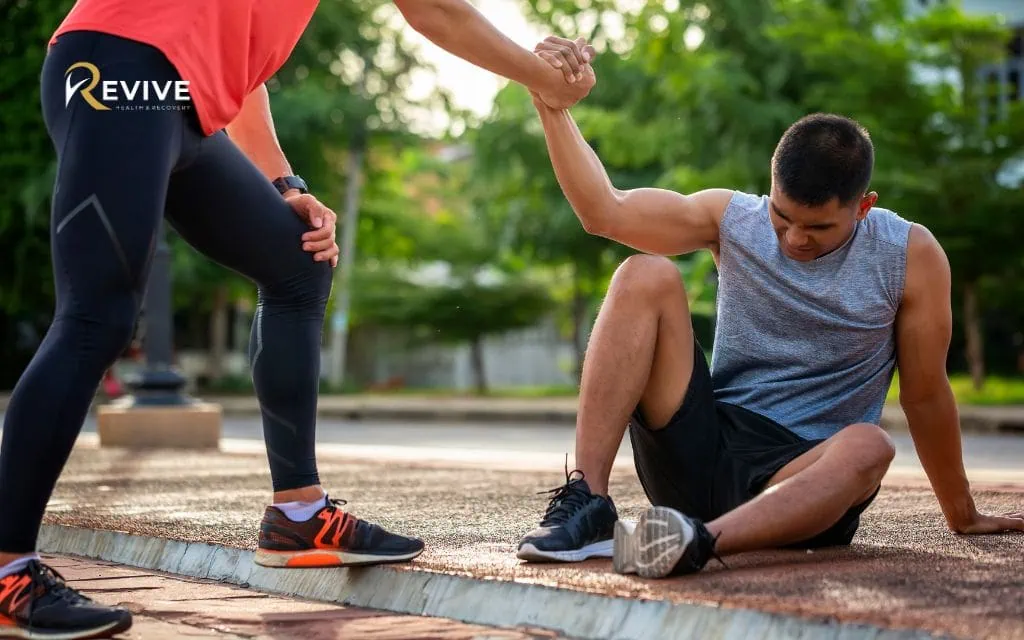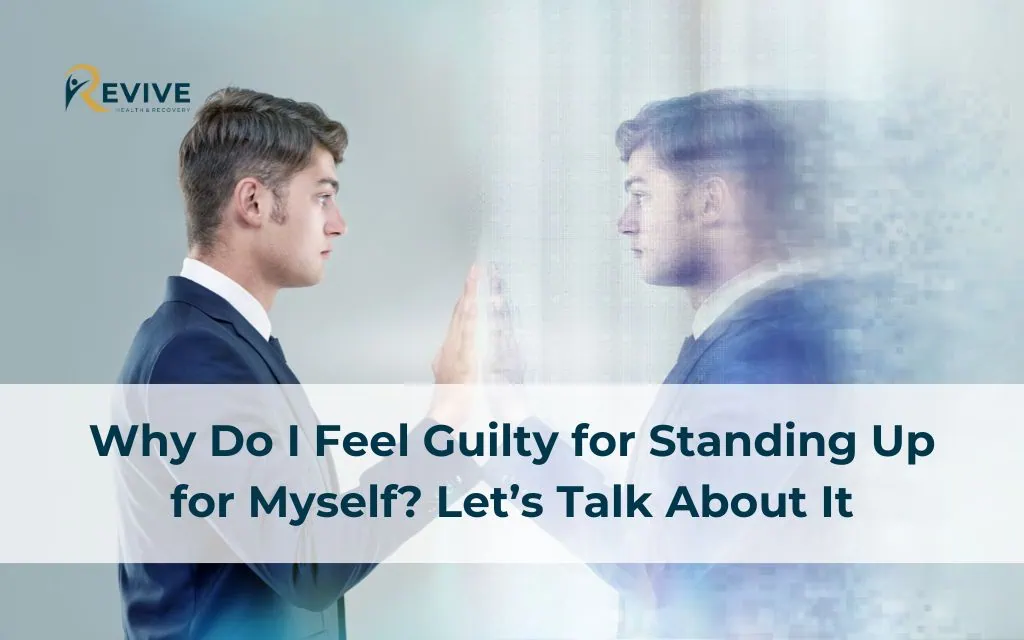That familiar knot in your stomach after setting a boundary. The racing thoughts questioning if you were too harsh. The overwhelming urge to apologize even when you’ve done nothing wrong. If you find yourself wondering, “Why do i feel guilty for standing up for myself?” know that you’re not alone.
At Revive Health Recovery, we see this struggle daily among our Denver clients. This emotional response has deep psychological roots that often connect to childhood experiences and internalized beliefs about your worth relative to others. In Colorado, according to Hope and Healing Ideas, where approximately 29.8% of adults report symptoms of anxiety or depression, these feelings can become particularly overwhelming.
Understanding Why You Feel Guilty When Standing Up for Yourself
The Psychological Roots of Assertiveness Guilt
Continuing wondering “why do I feel guilty for standing up for myself?” Your feelings of guilt when advocating for yourself often stem from early life experiences that shaped your understanding of relationships. Many people develop people-pleasing patterns as survival mechanisms in childhood. When young minds learn that their needs matter less than others’, they carry this belief into adulthood.
“Most clients who struggle with assertiveness have internalized the belief that their needs are secondary,” explains our lead therapist at Revive Health Recovery. “This creates a foundation where any self-advocacy feels like a violation of their core programming.”
In Denver’s achievement-focused culture, these feelings can intensify. Colorado ranks 46th out of 50 states in mental health services, making proper treatment for assertiveness issues more challenging to access. This scarcity compounds the difficulty many face when trying to break free from guilt cycles.
Common Triggers for Guilt After Self-Advocacy
Certain situations consistently trigger stronger guilt responses. Perhaps you feel physically ill after disagreeing with your boss, or you spiral into anxiety after telling a friend you can’t help them move. These reactions often intensify when:
- The other person responds negatively
- You were raised in an environment where “harmony” was valued above authenticity
- You’re dealing with someone who has benefited from your lack of boundaries
Colorado’s outdoor-focused lifestyle creates unique social pressure to appear “together” and conflict-free. This cultural context can make assertiveness feel even more uncomfortable for Denver residents to stop wondering “why do I feel guilty for standing up for myself”
The Hidden Cost of Not Standing Up for Yourself
While avoiding confrontation might provide temporary relief from guilt, the long-term costs are substantial. Consistently prioritizing others’ needs above your own creates a self-reinforcing cycle that can contribute to depression, anxiety, and even physical health problems.

The Emotional Toll of Chronic People-Pleasing
People-pleasing behavior might seem harmless, but research shows a direct connection between suppressed needs and depression symptoms. When you repeatedly silence your own voice, you’re teaching your brain that your needs don’t matter. This cognitive pattern becomes stronger over time, making each attempt at self-advocacy increasingly difficult.
The specific relationship between Denver’s urban culture and pressure to maintain social harmony can intensify these feelings of guilt. Many of our clients report that Colorado’s emphasis on “good vibes” makes them feel particularly bad when they need to assert themselves.
The same as question “why do I feel guilty for standing up for myself?”, one Revive Health Recovery client share that “I always felt like I was ruining everyone’s day when I spoke up.” And “Learning that my needs are valid was transformative.”
Breaking the Fear-Avoidance Cycle
Each time you pause wondering “why do I feel guilty for standing up for myself”, you temporarily feel relief. However, this relief strengthens the belief that assertiveness is dangerous, creating a self-perpetuating cycle:
- You have a need that requires self-advocacy
- You feel fear and anticipatory guilt
- You remain silent to avoid these feelings
- You experience temporary relief
- You later feel regret and resentment
- The cycle strengthens, making the next situation harder
At Revive Health Recovery in Denver, we specialize in breaking this cycle through personalized treatment approaches that address both the symptoms and root causes of assertiveness guilt.
CBT Approaches: Reframing Your Thinking About Self-Advocacy
If You’re continue wondering “why do I feel guilty for standing up for myself”. Then Cognitive Behavioral Therapy (CBT) offers powerful tools for changing the thought patterns that fuel guilt when standing up for yourself. Our Denver therapists are experts in applying these techniques to assertiveness challenges.
Identifying Unhelpful Thought Patterns
Many guilt responses stem from cognitive distortions – inaccurate thought patterns that feel true but don’t reflect reality. Common distortions include:
- Catastrophizing: “If I say no, they’ll never speak to me again.”
- Mind reading: “They think I’m selfish for setting this boundary.”
- Should statements: “I should always put others first.”
Learning to recognize these patterns is the first step toward freedom from wondering “why do I feel guilty for standing up for myself?”. Our therapists help you identify your specific thought distortions around self-advocacy and develop strategies to challenge them effectively.

Practical Thought Challenging Techniques
Once you’ve identified unhelpful thought patterns, you can begin to question their validity. Consider these reframing strategies:
- Replace “I’m being selfish” with “I have a right to my needs just like everyone else.”
- Transform “They’ll hate me if I say no” into “They might be disappointed, but our relationship can handle disappointment.”
- Shift “I should always be available” to “I’m a human with limits, not an infinite resource.”
At Revive Health Recovery, we offer uniquely personalized approaches to building assertiveness skills as part of comprehensive mental health treatment. Our Denver location provides specialized services for assertiveness training that many clients don’t realize are available.
Practical Steps to Stand Up for Yourself Without Guilt
Understanding the psychology behind your guilt is important, but practical skills are equally essential. Here are strategies to help you advocate for yourself more effectively:
The Three-Step Assertiveness Formula
- Name the situation objectively: “When meetings run past the scheduled end time…”
- Express your feeling or need: “…I feel frustrated because I have other commitments.”
- Make a specific request: “Could we please end on time or reschedule the remaining items?”
This formula provides a clear structure for difficult conversations while minimizing the guilt that often follows. Practice it in lower-stress situations first to build your confidence.

Starting Small: Building Your Assertiveness Muscle
Like any skill, assertiveness improves with practice. Begin with situations where the stakes feel lower:
- Sending back an incorrect order at a restaurant
- Declining an optional social invitation
- Expressing a preference about where to eat with friends
Each successful experience helps rewire your brain’s association between standing up for yourself and guilt. As one Revive Health Recovery client noted, “Starting with small boundaries helped me work up to the bigger conversations I’d been avoiding for years.”
The connection between Colorado’s high rates of substance use disorders and difficulty with self-advocacy presents a distinct treatment challenge. Many people use substances to cope with the discomfort of unmet needs, creating a cycle that requires specialized intervention.
When Guilt Has Deeper Roots: Trauma and Self-Advocacy
For many people asking “why do I feel guilty for standing up for myself” the answer lies in past trauma. Complex PTSD and developmental trauma can create profound difficulties with assertiveness that require specialized approaches.
Recognizing When Childhood Experiences Fuel Present Guilt
Your assertiveness difficulties may have deeper roots if:
- Your guilt response feels disproportionately intense
- You experience physical symptoms like nausea or shaking when setting boundaries
- The thought of confrontation triggers panic or dissociation
- You feel guilt even when imagining standing up for yourself
Denver therapists increasingly recognize the role of developmental trauma in assertiveness difficulties, leading to innovative treatment approaches. At Revive Health Recovery, we incorporate trauma-informed care into our assertiveness training programs.
Trauma-Informed Approaches to Building Assertiveness
When guilt has traumatic origins, cognitive approaches alone may not be sufficient. Our treatment programs integrate:
- Somatic (body-based) techniques to address physical stress responses
- Nervous system regulation skills to manage overwhelming emotions
- Graduated exposure to assertiveness situations with support
- Processing of past experiences that created the guilt-assertiveness connection
The intersection of Mountain West cultural values and difficulty with self-advocacy creates distinct therapeutic needs that our Denver facility is uniquely positioned to address.
FAQs About Feeling: Why Do I Feel Guilty For Standing Up For Myself
Why do I feel physically sick when I have to confront someone, even when I’m in the right?
Physical symptoms like nausea, racing heart, or trembling occur because your nervous system perceives confrontation as a threat. This reaction often stems from early experiences where self-advocacy led to negative consequences. At Revive Health Recovery, we teach both cognitive and somatic techniques to help regulate these physical responses.
How can I tell the difference between appropriate guilt and unnecessary guilt?
Appropriate guilt motivates repair after causing harm, while unnecessary guilt occurs when you’ve simply met your own needs. Ask yourself: “Would I judge someone else negatively for doing what I did?” If not, your guilt is likely unnecessary. Our Denver therapists can help you develop personalized tools for making this distinction.
Will people stop liking me if I start setting more boundaries?
Healthy relationships can accommodate boundaries. Some relationships may change as you become more assertive, but quality connections will adapt and often improve. People who cannot respect your boundaries may distance themselves, which ultimately creates space for healthier relationships. Revive Health Recovery offers relationship counseling to navigate these transitions.
How long does it typically take to overcome feelings of guilt when being assertive?
Recovery timelines vary based on the depth of conditioning and presence of trauma. Many clients notice improvement within 8-12 weeks of consistent work, though deeper healing may take longer. Revive Health Recovery creates individualized treatment plans that respect your unique healing journey.
Can medication help with the anxiety I feel around standing up for myself?
For some people, medication can help manage the overwhelming anxiety that prevents effective self-advocacy. However, it works best when combined with therapy that addresses root causes. Our Denver facility offers comprehensive assessment to determine the most effective approach for your specific situation.
Why Choose Revive Health Recovery for Assertiveness and Boundary Issues
Revive Health Recovery stands apart in Denver’s mental health landscape by offering specialized support for people struggling with assertiveness guilt. Our comprehensive approach integrates evidence-based treatments with deep empathy for the challenges you face.
Our Specialized Approach to Building Healthy Self-Advocacy
Unlike general mental health services, our programs specifically address the unique challenges of assertiveness guilt. We combine cognitive behavioral therapy, trauma-informed care, and practical skill-building in a personalized treatment plan that addresses both symptoms and underlying causes.
Our Denver-based therapists understand Colorado’s distinct cultural context and how it impacts assertiveness challenges. We’ve helped hundreds of clients transform their relationship with guilt and develop confident self-advocacy skills.
Comprehensive Mental Health Support Beyond Assertiveness
Many clients discover that assertiveness difficulties connect to other mental health concerns like depression, anxiety, or trauma. Our integrated treatment approach addresses these interconnected issues, providing holistic support for your overall wellbeing.
“I came in because I couldn’t stand up for myself without feeling terrible guilt,” shares a client. “Through therapy at Revive, I not only learned assertiveness skills but also discovered how my anxiety and past experiences were feeding the cycle.”
5 Reasons to Choose Revive Health Recovery
- Specialized expertise in assertiveness training and boundary setting
- Convenient Denver location with flexible scheduling options
- Compassionate, non-judgmental therapeutic environment
- Evidence-based treatment approaches tailored to your needs
- Comprehensive support from initial assessment through ongoing care
Start Your Journey to Guilt-Free Self-Advocacy Today
You don’t have to continue wondering “why do I feel guilty for standing up for myself.” At Revive Health Recovery, we understand the complex emotions surrounding assertiveness and offer specialized support to help you develop healthy self-advocacy skills.
Our Denver facility provides a safe, supportive environment where you can explore these feelings and build the confidence to advocate for yourself without the weight of guilt. Don’t let another day go by feeling bad about taking care of your own needs.
Contact Revive Health Recovery today at (303) 268-4655 or email us at contact@revivehealthrecovery.com to schedule a confidential consultation. Your journey to guilt-free self-advocacy can begin right now with one simple call.



